|
|
|
Sort Order |
|
|
|
Items / Page
|
|
|
|
|
|
|
| Srl | Item |
| 1 |
ID:
119953
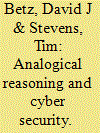

|
|
|
|
|
| Publication |
2013.
|
| Summary/Abstract |
This article is an attempt to interrogate some of the predominant forms of analogical reasoning within current cyber-security discourse, with a view to clarifying their unstated premises, major strengths and, vitally, points of conceptual failure. It seeks to improve dialogue between and across the various epistemic communities involved with cyber-security policy. As we seek to adapt to the new security realities of the information age, it is incumbent upon scholars and strategists to address the benefits of connectivity, in all its dimensions, as much as the threats it presents. Current cyber-security discourse channels us into a winner-takes-all modality that is neither desirable nor necessary in the current strategic reality.
|
|
|
|
|
|
|
|
|
|
|
|
|
|
|
|
| 2 |
ID:
164632
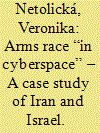

|
|
|
|
|
| Summary/Abstract |
The article focuses on the area of cyber security, specifically on the theory of arms race in cyberspace, which is applied to case study of Iran and Israel. The first part describes the evolution of arms race in conventional environment with link to cyberspace. In the second part, the article focuses on description of selected indicators that prove/disprove the arms race in cyberspace in the relationship between selected dyad. In conclusion, the summary presents not only the selected states but also debates the overall usability of the concept of arms race in cyberspace in its general use for further research.
|
|
|
|
|
|
|
|
|
|
|
|
|
|
|
|
| 3 |
ID:
140494
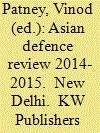

|
|
|
|
|
| Publication |
New Delhi, KW Publishers Pvt Ltd, 2015.
|
| Description |
vii, 240p.hbk
|
| Standard Number |
9789383649648
|
|
|
|
|
|
|
|
|
|
|
|
Copies: C:1/I:0,R:0,Q:0
Circulation
| Accession# | Call# | Current Location | Status | Policy | Location |
| 058273 | 355.03305/PAT 058273 | Main | On Shelf | General | |
|
|
|
|
| 4 |
ID:
142909
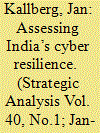

|
|
|
|
|
| Summary/Abstract |
In this commentary, I will use strategic cyberwar theory1 to explain why India has a higher level of cyber resilience than several of its potential adversaries. Even if India has challenges in its government-led cyber defence,2 there are cyber resilience benefits to be drawn from the way Indian society operates, functions and is constitutionally designed and accepted by its constituents, independently of any cyber defence efforts. First, the concept of strategic cyberwar. A strategic cyberwar is a major conflict relying on heavy utilisation of digital means, a form of conflict that we have not yet seen but that is likely to be a potential threat a few decades into the future. Even if technological breakthroughs, adaptations and software development are accelerating at an increasingly high rate, the delay is not a technical issue. Technical evolutions in the software and services sphere are single lines of development. The complexity of cyber war increases with the time factor when cyber conflicts are likely thought at computational speeds. This require an acceptance of cyber as a form of war by itself because it operates in a battle space untangled from other forms of war fighting. Therefore, cyber cannot be seen as only an enabler in traditional defence.
|
|
|
|
|
|
|
|
|
|
|
|
|
|
|
|
| 5 |
ID:
130048
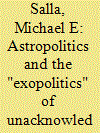

|
|
|
|
|
| Publication |
2014.
|
| Summary/Abstract |
The role of unacknowledged classified programs remains an enigma for fully understanding activities in space and the study of astropolitics. Classified programs by law are not publicly announced, and remain inaccessible to all except those with valid security clearances to be briefed about them. In the United States, waived Unacknowledged Special Access Programs are the most highly classified programs conducted by the military and intelligence community. The same classification protocols are also required of private contractors working with U.S. military departments and intelligence agencies on classified programs. As space continues to grow in its national security significance, the number of these unacknowledged programs pertaining to space is likely to grow significantly from its current number. This requires adopting the necessary conceptual tools and methodological flexibility for investigating unacknowledged activities in space. This also extends to evidence concerning unidentified flying objects and extraterrestrial life. This article suggests that "exopolitics" is a unique multidisciplinary approach to extraterrestrial life that offers a helpful set of conceptual tools for studying unacknowledged space activities, and complements the field of astropolitics.
|
|
|
|
|
|
|
|
|
|
|
|
|
|
|
|
| 6 |
ID:
137241


|
|
|
|
|
| Summary/Abstract |
Who did it? Attribution is fundamental. Human lives and the security of the state may depend on ascribing agency to an agent. In the context of computer network intrusions, attribution is commonly seen as one of the most intractable technical problems, as either solvable or not solvable, and as dependent mainly on the available forensic evidence. But is it? Is this a productive understanding of attribution? — This article argues that attribution is what states make of it. To show how, we introduce the Q Model: designed to explain, guide, and improve the making of attribution. Matching an offender to an offence is an exercise in minimising uncertainty on three levels: tactically, attribution is an art as well as a science; operationally, attribution is a nuanced process not a black-and-white problem; and strategically, attribution is a function of what is at stake politically. Successful attribution requires a range of skills on all levels, careful management, time, leadership, stress-testing, prudent communication, and recognising limitations and challenges.
|
|
|
|
|
|
|
|
|
|
|
|
|
|
|
|
| 7 |
ID:
156959
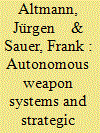

|
|
|
|
|
| Summary/Abstract |
Autonomous weapon systems are prone to proliferation, and are likely to lead to increased crisis instability and escalation risks.
|
|
|
|
|
|
|
|
|
|
|
|
|
|
|
|
| 8 |
ID:
190905


|
|
|
|
|
| Summary/Abstract |
Transformations in state violence are intimately associated with technological capacity. Like previous era-defining technologies, global digital networks have changed state violence. Offensive cyber capabilities (OCCs) appear to constitute a major technological development that offers the potential for reducing state violence. This article asks: are OCCs really the better angels of our digital nature? Current scholarship in strategic studies, adopting a narrow definition of violence, conceives of OCCs as largely non-violent. This ignores how technology has given rise to new forms of harm to individuals and communities, particularly in the context of violent state repression. We propose using an expanded definition of violence, including affective and community harms, and argue that OCCs relocate, rather than reduce, state violence towards non-bodily harms. Even though their lethal effects are limited, OCCs are not, as is supposed, a non-violent addition to state arsenals. This conclusion has important implications for international affairs, including re-orienting defensive cybersecurity efforts and altering calculations around the perception of OCCs by adversaries.
|
|
|
|
|
|
|
|
|
|
|
|
|
|
|
|
| 9 |
ID:
188865
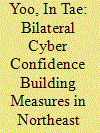

|
|
|
|
|
| Summary/Abstract |
Under what conditions do countries form confidence building measures (CBMs)
in the cyber domain? How do those conditions affect the frequency and type of
cyber CBMs (CCBMs)? The extant literature surveys existing CCBMs, providing
fragmented pictures of them at either the global, regional, or bilateral levels.
Thus, there is a lack of systematically comparative perspectives between multiple
efforts for states’ cyber confidence–building. This deficiency implies that little
to no research has been dedicated to analytical examinations of the development
of CCBMs. The present article offers a framework to assess the development
and theoretical arguments to understand its underlying causes. It argues that the
willingness of political leaders affected by the international strategic–security
context is a necessary condition, in addition to the cost-benefit calculation of
policymakers, affecting the frequency and type of CCBMs. To examine the
arguments, the present article overviews the global development of the discussion
of CCBMs at the UNGGE and OEWG. Then it presents the networks of CCBMs
in Northeast Asia where the staunchest alliances as well as fierce strategic–security
competitions have taken hold in the emergence of the new cyber domain. Lastly,
the article investigates the processes of bilateral CCBMs formation in three dyads
between the United States and each of three states, namely, Russia, China, and
Japan. The empirical findings support the theoretical arguments
|
|
|
|
|
|
|
|
|
|
|
|
|
|
|
|
| 10 |
ID:
149004
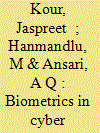

|
|
|
|
|
| Summary/Abstract |
Computers play an important role in our daily lives and its usage has grown manifolds today. With ever increasing demand of security regulations all over the world and large number of services provided using the internet in day to day life, the assurance of security associated with such services has become a crucial issue. Biometrics is a key to the future of data/cyber security. This paper presents a biometric recognition system which can be embedded in any system involving access control, e-commerce, online banking, computer login etc. to enhance the security. Fingerprint is an old and mature technology which has been used in this work as biometric trait. In this paper a fingerprint recognition system based on no minutiae features: Fuzzy features and Invariant moment features has been developed. Fingerprint images from FVC2002 are used for experimentation. The images are enhanced for improving the quality and a region of interest (ROI) is cropped around the core point. Two sets of features are extracted from ROI and support vector machine (SVM) is used for verification. An accuracy of 95 per cent is achieved with the invariant moment features using RBF kernel in SVM.
|
|
|
|
|
|
|
|
|
|
|
|
|
|
|
|
| 11 |
ID:
127600
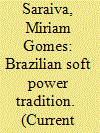

|
|
|
|
|
| Publication |
2014.
|
| Summary/Abstract |
Over the past decade, amid growing international fragmentation and declining US hegemony, Brazil has assertively expanded its participation in multilateral forums as part of a diplomatic strategy that envisions a reformulation of international institutions. At the same time, Brazil has also worked on building a leadership role within South America. These global and regional aims continue to shape the country's use of soft power. Indeed, soft power-defined by the political scientist Joseph S. Nye Jr. as influencing the behavior of others via attraction or persuasion rather than coercion or payment-is nothing new in Brazil's international dealings. Since the early 1900s, the nation has used such a strategy under different labels in conjunction with two beliefs central to its foreign policy: the need to build and assure Brazil's autonomy in its development strategy and foreign policy choices, and the desire to raise its global political profile
|
|
|
|
|
|
|
|
|
|
|
|
|
|
|
|
| 12 |
ID:
168005
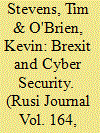

|
|
|
|
|
| Summary/Abstract |
Brexit is likely to have an effect on UK–EU cyber security cooperation. While there are ongoing reasons to be positive about the state of UK–EU cyber security, Tim Stevens and Kevin O’Brien show how Brexit will have negative impacts on cybercrime policing and cyber threat intelligence sharing, particularly in a ‘no-deal’ scenario, and argue that the absence of a negotiated settlement will damage the cyber security of the UK and the EU.
|
|
|
|
|
|
|
|
|
|
|
|
|
|
|
|
| 13 |
ID:
132128
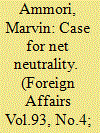

|
|
|
|
|
| Publication |
2014.
|
| Summary/Abstract |
For all the withering criticism leveled at the White House for its botched rollout of HealthCare.gov, that debacle is not the biggest technology-related failure of Barack Obama's presidency. That inauspicious distinction belongs to his administration's incompetence in another area: reneging on Obama's signature pledge to ensure "net neutrality," the straightforward but powerful idea that Internet service providers (ISPs) should treat all traffic that goes through their networks the same. Net neutrality holds that ISPs shouldn't offer preferential treatment to some websites over others or charge some companies arbitrary fees to reach users. By this logic, AT&T, for example, shouldn't be allowed to grant iTunes Radio a special "fast lane" for its data while forcing Spotify to make do with choppier service.
|
|
|
|
|
|
|
|
|
|
|
|
|
|
|
|
| 14 |
ID:
137234
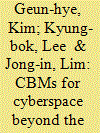

|
|
|
|
|
| Summary/Abstract |
This paper aims to analyze confidence-building measures (CBMs) for cyberspace taking place in Northeast Asia. Accordingly, it explores features of cyber security in the Northeast Asian region and concepts of CBMs for cyberspace. Then, it studies networks of CBMs for cyberspace that took place on the government level in the region from 2009 through the first half of 2014 by using the network analysis method, which is useful for studying current social relations. This study analyzes the structure of CBMs networks used in the region for the past six years and the actors. Conclusions of this study are as follows: First, CBMs for cyberspace in Northeast Asia are focused on the United States. Second, the CBMs in the region have similar features to those of traditional security cooperation. Thirdly, they are strongly based on realism. From the perspective of networks, this study is meaningful in that it used a macro approach to analyze CBMs, which was difficult to perform by using conventional methods.
|
|
|
|
|
|
|
|
|
|
|
|
|
|
|
|
| 15 |
ID:
140311
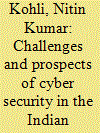

|
|
|
| 16 |
ID:
146558
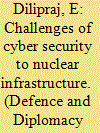

|
|
|
| 17 |
ID:
105460
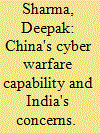

|
|
|
|
|
| Publication |
2011.
|
| Summary/Abstract |
The Chinese cyber warfare department's multiple agencies and individuals are seriously working towards the overall objective of instantly disrupting or at least weakening the adversary's computer networks so as to paralyse his decision making capability at the very commencement of hostilities. It is very difficult to protect networks from such attacks. The weakest link in cyber security measures are the persons operating the system who often, knowingly or unknowingly, default on cyber security measures. It is possible for defence to have an exclusive secure network with air gap from civil and public networks which ensures that the adversary is not allowed to even access its periphery.
|
|
|
|
|
|
|
|
|
|
|
|
|
|
|
|
| 18 |
ID:
145002
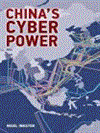

|
|
|
|
|
| Publication |
London, IISS, 2016.
|
| Description |
155p.pbk
|
| Series |
Adelphi Series; no. 456
|
| Standard Number |
9781138211162
|
|
|
|
|
|
|
|
|
|
|
|
Copies: C:2/I:0,R:0,Q:0
Circulation
| Accession# | Call# | Current Location | Status | Policy | Location |
| 058653 | 303.48830951/INK 058653 | Main | On Shelf | General | |
| 058755 | 303.48830951/INK 058755 | Main | On Shelf | General | |
|
|
|
|
| 19 |
ID:
142454
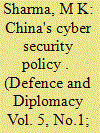

|
|
|
| 20 |
ID:
170611
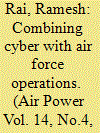

|
|
|
|
|
|
|
|